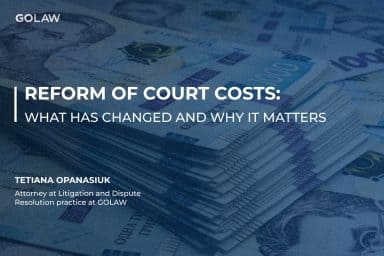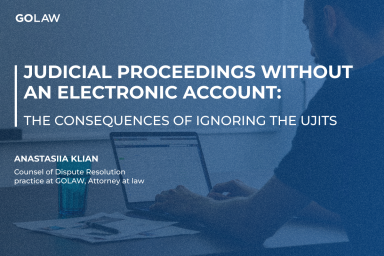Legislative news digest: LEGAL HOTLINE 22.03.2018
Tags
Legal news for your attention:
TWO-TIER PRIVATISATION SYSTEM TO BE INTRODUCED
The Law of Ukraine “On Privatisation of State-owned and Municipal Property” came into force and provides for a two-tier privatisation system, namely:
- Large-scale privatisation (objects, the asset value of which for the last accounting year exceeds UAH 250 million) will be conducted based on the multistage procedure with the participation of a competent adviser;
- Small-scale privatisation objects will be sold through electronic platforms.
The Law stipulates two possible ways of privatization – the auction and the repurchase of privatisation objects, if the property was already leased at the time of adoption of the Law.
Buyers that are registered in offshore areas and have an opaque ownership structure (i.e., the beneficiary owners thereof are not 100 percent disclosed), as well as buyers originating from aggressor states cannot be buyers of privatisation objects. Also, enterprises established under the laws of countries, which do not cooperate with the FATF, as well as individuals and legal entities that are subject to special economic and other restrictive sanctions will not be able to participate in privatisation of Ukrainian enterprises.
Before adoption of the new Law, disputes that arose in this area were considered by Ukrainian courts; the parties could choose a court to consider disputes between them only if a foreign element was involved.
Now, based on the consent of parties (even if there is no foreign element), the purchase and sale agreement for a privatisation object can provide for the possibility to resolve disputes in the International Commercial Arbitration Court. Herewith, if the parties do not determine a specific court, any dispute, argument, or claim are not subject to final settlement in arbitration in accordance with the Arbitration Rules of the Arbitration Institute of the Stockholm Chamber of Commerce.
THE NEW LAW ON LIMITED LIABILITY COMPANIES WILL COME INTO FORCE ON JUNE 17, 2018
On March 17, 2018, the Law of Ukraine No. 2275-VIII “On Limited Liability and Additional Liability Companies” was officially promulgated. It will come into force in three months from the day of its publication, that is, on June 17, 2018 (except for Part 2 of Article 23 of the Law, which concerns the transfer of a LLC share to the heir and will come into force in one year after the day of this Law taking effect).
The main novelties of the Law are the following: the number of LLC participants is not limited; the new tools for Ukraine are introduced: a corporate agreement and an irrevocable power of attorney on corporate rights; information on the amount of the authorised capital and the list of company participants are excluded from the list of information that has to be enshrined in the charter; the time limit for members making their contributions to the authorised capital is reduced from one year to six months; from now on, a company participant holding a share of 50% or more of the authorised capital cannot withdraw from the company without getting the consent of other participants.
Within one year from the date of entry into force of the Law, companies have to make appropriate changes to their charters. It is important that for this period, companies are exempt from paying administrative fees for the registration of such changes.
EXPENSES ON LABOUR PROTECTION WERE IMPROVED
The Government has improved the mechanism of financing the labour protection measures taken by employers and keeping records of labour protection costs in bookkeeping, tax, and management accounting.
On March 13, 2018, the Resolution of the Cabinet of Ministers of Ukraine “On Amendments to the Resolution of the Cabinet of Ministers of Ukraine No. 994 of June 27, 2003”, No. 134 of February 28, 2018, came into force. This Resolution established that expenses on labour protection shall be formed in view of the requirements of the National Accounting Regulations (Standards) (NR(S)AU) or International Financial Reporting Standards (IFRS), as well as other regulatory legal acts on bookkeeping and financial reporting.
The amount and sources of financing of labour protection costs shall be defined in the collective agreement.
NEW RETAIL RULES CAME INTO FORCE
On March 16, 2018, amendments to the Rules of Retail of Non-food Products approved by the Order of the Ministry of Economic Development and Trade of Ukraine No. 80 of January 23, 2018 came into force.
Any entity can apply discounts and run sales, but it is obliged to inform consumers about the price that was set before the application of discounts, price reduction, or running a sale, and afterwards.
Employees of the entity are obliged to provide consumers with the necessary, accessible, trustworthy, and timely information about:
- names of goods, denomination, or reproduction of the mark for goods and services under which they are sold;
- basic properties of goods;
- content of substances harmful to health, which are established by regulatory legal acts, as well as warnings about the use of certain goods, if such warnings are stipulated by regulatory legal acts;
- presence of GMO in products;
- production and expiration dates (service life) of goods;
- storage and use conditions;
- warranty obligations of the manufacturer (executor);
- name and location of the manufacturer (executor, or seller) and the enterprise that carries out functions thereof in accepting claims from consumers, as well as carries out repairs and maintenance.
In the event of revealing untrustworthy information about the product (if it does not harm consumer’s life, health, or property), the manufacturer (seller) has to withdraw this product from sale and make information about it consistent within a week.
Information about goods can be placed in locations where they are being sold, as well as brought to the attention of consumer based on their consent through means of remote communication.
Also, entities are obliged to ensure the possibility of using electronic payment facilities for making payments for the goods (services), as established by the law.
Sign up to be aware
New achievements are inspired by information. GO further, don’t miss out GOLAW news and legal alerts
Our expertise
-
- Antitrust and Competition
- Banking and Finance
- Compliance, Corporate Governance and Risk Management
- Corporate and M&A
- Criminal and White Collar Defence
- Defense in Anti-corruption procedures and regulations
- Labor and Employment
- Natural Resources and Environment
- Government Relations (GR)
- Insolvency and Corporate Recovery
- Intellectual property
- International trade
- Legal support of business and private Сlients in Germany
- Litigation and dispute resolution
- Private clients
- Real Estate and Construction
- Energy and Natural Resources
- Restructuring, Claims and Recoveries
- Martial Law
- Tax and Customs
-
- Agribusiness
- Aviation
- Chemical industry
- Engineering, Construction and Building Materials
- Natural Resources and Environment
- Financial institutions
- IT and AI
- Industry and manufacturing
- Healthcare industries, Life sciences and Pharmaceuticals
- Media, Entertainment, Sports and Gambling
- Retail, FMCG and E-Commerce
- Transport and Logistics
We use cookies to improve performance of our website and your user experience.
Cookies policy
Cookies settings







